Dongkyu Lee
Department of Smart Car Engineering, Chungbuk National University, Korea
DreamFLEX: Learning Fault-Aware Quadrupedal Locomotion Controller for Anomaly Situation in Rough Terrains
Feb 09, 2025



Abstract:Recent advances in quadrupedal robots have demonstrated impressive agility and the ability to traverse diverse terrains. However, hardware issues, such as motor overheating or joint locking, may occur during long-distance walking or traversing through rough terrains leading to locomotion failures. Although several studies have proposed fault-tolerant control methods for quadrupedal robots, there are still challenges in traversing unstructured terrains. In this paper, we propose DreamFLEX, a robust fault-tolerant locomotion controller that enables a quadrupedal robot to traverse complex environments even under joint failure conditions. DreamFLEX integrates an explicit failure estimation and modulation network that jointly estimates the robot's joint fault vector and utilizes this information to adapt the locomotion pattern to faulty conditions in real-time, enabling quadrupedal robots to maintain stability and performance in rough terrains. Experimental results demonstrate that DreamFLEX outperforms existing methods in both simulation and real-world scenarios, effectively managing hardware failures while maintaining robust locomotion performance.
TRG-planner: Traversal Risk Graph-Based Path Planning in Unstructured Environments for Safe and Efficient Navigation
Jan 03, 2025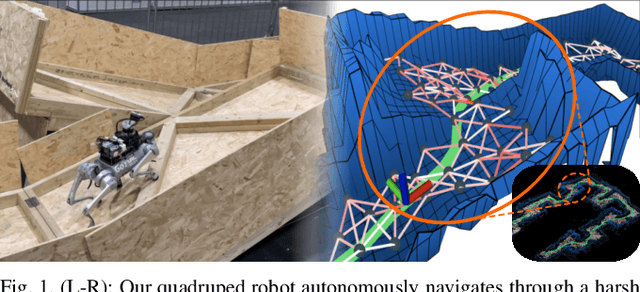
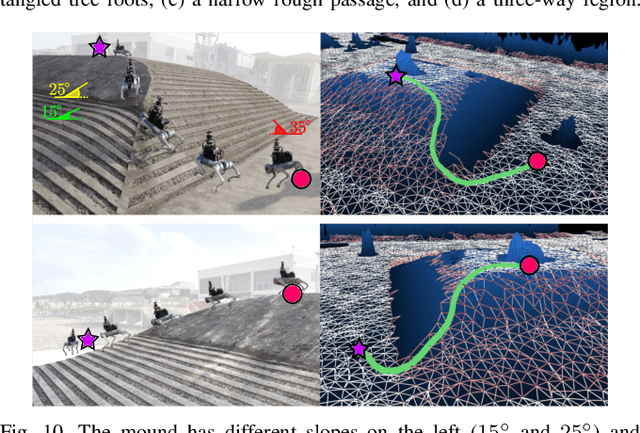


Abstract:Unstructured environments such as mountains, caves, construction sites, or disaster areas are challenging for autonomous navigation because of terrain irregularities. In particular, it is crucial to plan a path to avoid risky terrain and reach the goal quickly and safely. In this paper, we propose a method for safe and distance-efficient path planning, leveraging Traversal Risk Graph (TRG), a novel graph representation that takes into account geometric traversability of the terrain. TRG nodes represent stability and reachability of the terrain, while edges represent relative traversal risk-weighted path candidates. Additionally, TRG is constructed in a wavefront propagation manner and managed hierarchically, enabling real-time planning even in large-scale environments. Lastly, we formulate a graph optimization problem on TRG that leads the robot to navigate by prioritizing both safe and short paths. Our approach demonstrated superior safety, distance efficiency, and fast processing time compared to the conventional methods. It was also validated in several real-world experiments using a quadrupedal robot. Notably, TRG-planner contributed as the global path planner of an autonomous navigation framework for the DreamSTEP team, which won the Quadruped Robot Challenge at ICRA 2023. The project page is available at https://trg-planner.github.io .
TRIP: Terrain Traversability Mapping With Risk-Aware Prediction for Enhanced Online Quadrupedal Robot Navigation
Nov 26, 2024



Abstract:Accurate traversability estimation using an online dense terrain map is crucial for safe navigation in challenging environments like construction and disaster areas. However, traversability estimation for legged robots on rough terrains faces substantial challenges owing to limited terrain information caused by restricted field-of-view, and data occlusion and sparsity. To robustly map traversable regions, we introduce terrain traversability mapping with risk-aware prediction (TRIP). TRIP reconstructs the terrain maps while predicting multi-modal traversability risks, enhancing online autonomous navigation with the following contributions. Firstly, estimating steppability in a spherical projection space allows for addressing data sparsity while accomodating scalable terrain properties. Moreover, the proposed traversability-aware Bayesian generalized kernel (T-BGK)-based inference method enhances terrain completion accuracy and efficiency. Lastly, leveraging the steppability-based Mahalanobis distance contributes to robustness against outliers and dynamic elements, ultimately yielding a static terrain traversability map. As verified in both public and our in-house datasets, our TRIP shows significant performance increases in terms of terrain reconstruction and navigation map. A demo video that demonstrates its feasibility as an integral component within an onboard online autonomous navigation system for quadruped robots is available at https://youtu.be/d7HlqAP4l0c.
Conditional Synthesis of 3D Molecules with Time Correction Sampler
Nov 01, 2024Abstract:Diffusion models have demonstrated remarkable success in various domains, including molecular generation. However, conditional molecular generation remains a fundamental challenge due to an intrinsic trade-off between targeting specific chemical properties and generating meaningful samples from the data distribution. In this work, we present Time-Aware Conditional Synthesis (TACS), a novel approach to conditional generation on diffusion models. It integrates adaptively controlled plug-and-play "online" guidance into a diffusion model, driving samples toward the desired properties while maintaining validity and stability. A key component of our algorithm is our new type of diffusion sampler, Time Correction Sampler (TCS), which is used to control guidance and ensure that the generated molecules remain on the correct manifold at each reverse step of the diffusion process at the same time. Our proposed method demonstrates significant performance in conditional 3D molecular generation and offers a promising approach towards inverse molecular design, potentially facilitating advancements in drug discovery, materials science, and other related fields.
Obstacle-Aware Quadrupedal Locomotion With Resilient Multi-Modal Reinforcement Learning
Sep 29, 2024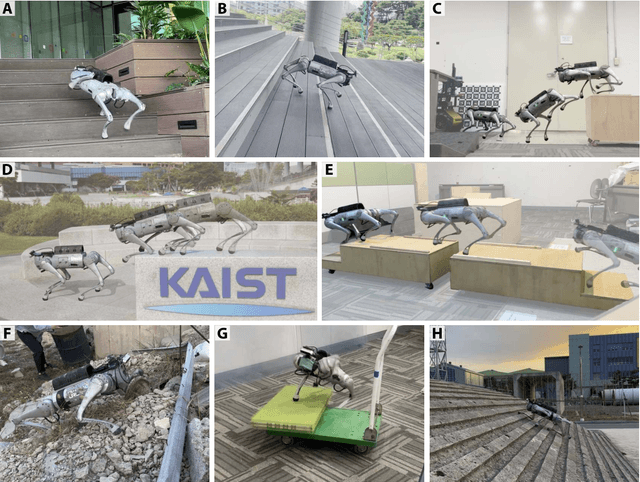
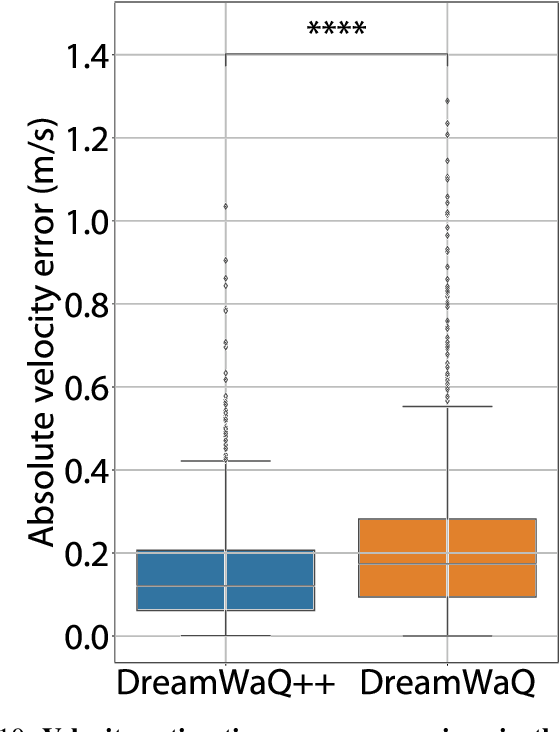

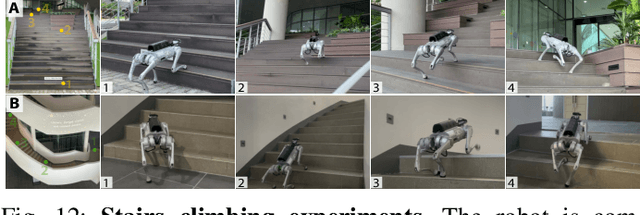
Abstract:Quadrupedal robots hold promising potential for applications in navigating cluttered environments with resilience akin to their animal counterparts. However, their floating base configuration makes them vulnerable to real-world uncertainties, yielding substantial challenges in their locomotion control. Deep reinforcement learning has become one of the plausible alternatives for realizing a robust locomotion controller. However, the approaches that rely solely on proprioception sacrifice collision-free locomotion because they require front-feet contact to detect the presence of stairs to adapt the locomotion gait. Meanwhile, incorporating exteroception necessitates a precisely modeled map observed by exteroceptive sensors over a period of time. Therefore, this work proposes a novel method to fuse proprioception and exteroception featuring a resilient multi-modal reinforcement learning. The proposed method yields a controller that showcases agile locomotion performance on a quadrupedal robot over a myriad of real-world courses, including rough terrains, steep slopes, and high-rise stairs, while retaining its robustness against out-of-distribution situations.
B-TMS: Bayesian Traversable Terrain Modeling and Segmentation Across 3D LiDAR Scans and Maps for Enhanced Off-Road Navigation
Jun 26, 2024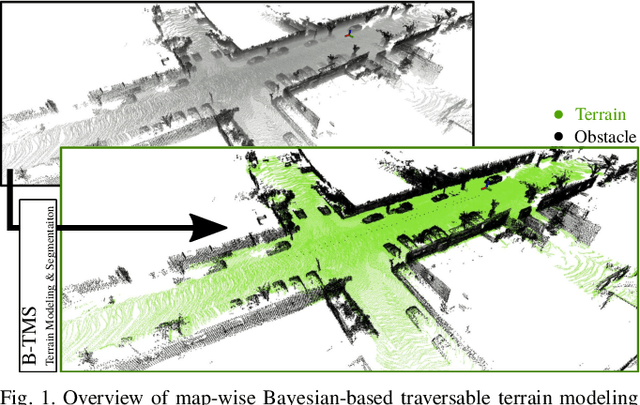
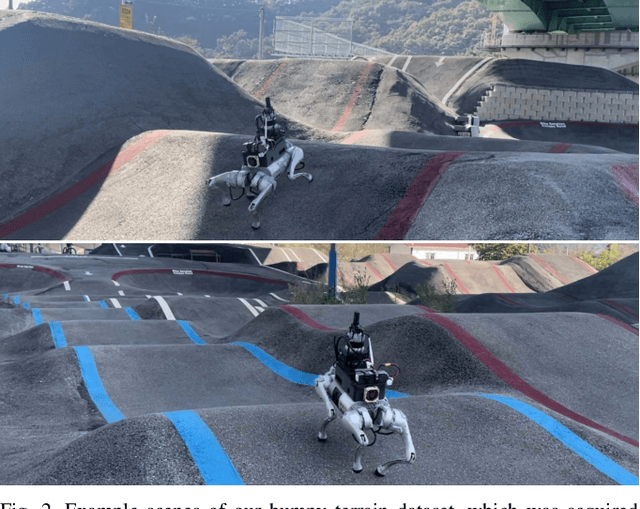
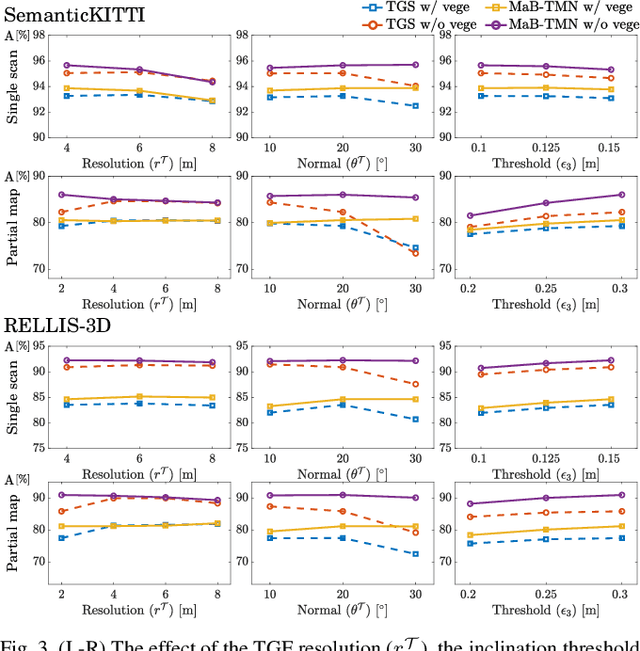
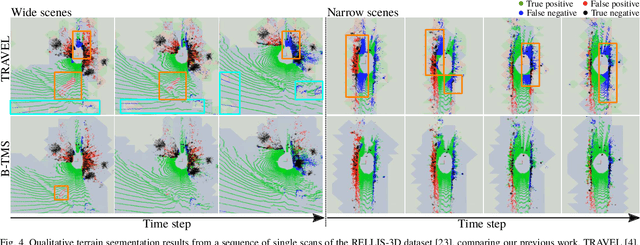
Abstract:Recognizing traversable terrain from 3D point cloud data is critical, as it directly impacts the performance of autonomous navigation in off-road environments. However, existing segmentation algorithms often struggle with challenges related to changes in data distribution, environmental specificity, and sensor variations. Moreover, when encountering sunken areas, their performance is frequently compromised, and they may even fail to recognize them. To address these challenges, we introduce B-TMS, a novel approach that performs map-wise terrain modeling and segmentation by utilizing Bayesian generalized kernel (BGK) within the graph structure known as the tri-grid field (TGF). Our experiments encompass various data distributions, ranging from single scans to partial maps, utilizing both public datasets representing urban scenes and off-road environments, and our own dataset acquired from extremely bumpy terrains. Our results demonstrate notable contributions, particularly in terms of robustness to data distribution variations, adaptability to diverse environmental conditions, and resilience against the challenges associated with parameter changes.
MATTER: Memory-Augmented Transformer Using Heterogeneous Knowledge Sources
Jun 07, 2024



Abstract:Leveraging external knowledge is crucial for achieving high performance in knowledge-intensive tasks, such as question answering. The retrieve-and-read approach is widely adopted for integrating external knowledge into a language model. However, this approach suffers from increased computational cost and latency due to the long context length, which grows proportionally with the number of retrieved knowledge. Furthermore, existing retrieval-augmented models typically retrieve information from a single type of knowledge source, limiting their scalability to diverse knowledge sources with varying structures. In this work, we introduce an efficient memory-augmented transformer called MATTER, designed to retrieve relevant knowledge from multiple heterogeneous knowledge sources. Specifically, our model retrieves and reads from both unstructured sources (paragraphs) and semi-structured sources (QA pairs) in the form of fixed-length neural memories. We demonstrate that our model outperforms existing efficient retrieval-augmented models on popular QA benchmarks in terms of both accuracy and speed. Furthermore, MATTER achieves competitive results compared to conventional read-and-retrieve models while having 100x throughput during inference.
Semi-Supervised Lifelong Language Learning
Nov 23, 2022



Abstract:Lifelong learning aims to accumulate knowledge and alleviate catastrophic forgetting when learning tasks sequentially. However, existing lifelong language learning methods only focus on the supervised learning setting. Unlabeled data, which can be easily accessed in real-world scenarios, are underexplored. In this paper, we explore a novel setting, semi-supervised lifelong language learning (SSLL), where a model learns sequentially arriving language tasks with both labeled and unlabeled data. We propose an unlabeled data enhanced lifelong learner to explore SSLL. Specially, we dedicate task-specific modules to alleviate catastrophic forgetting and design two modules to exploit unlabeled data: (1) a virtual supervision enhanced task solver is constructed on a teacher-student framework to mine the underlying knowledge from unlabeled data; and (2) a backward augmented learner is built to encourage knowledge transfer from newly arrived unlabeled data to previous tasks. Experimental results on various language tasks demonstrate our model's effectiveness and superiority over competitive baselines under the new setting SSLL.
Improving Meta-learning for Low-resource Text Classification and Generation via Memory Imitation
Mar 22, 2022



Abstract:Building models of natural language processing (NLP) is challenging in low-resource scenarios where only limited data are available. Optimization-based meta-learning algorithms achieve promising results in low-resource scenarios by adapting a well-generalized model initialization to handle new tasks. Nonetheless, these approaches suffer from the memorization overfitting issue, where the model tends to memorize the meta-training tasks while ignoring support sets when adapting to new tasks. To address this issue, we propose a memory imitation meta-learning (MemIML) method that enhances the model's reliance on support sets for task adaptation. Specifically, we introduce a task-specific memory module to store support set information and construct an imitation module to force query sets to imitate the behaviors of some representative support-set samples stored in the memory. A theoretical analysis is provided to prove the effectiveness of our method, and empirical results also demonstrate that our method outperforms competitive baselines on both text classification and generation tasks.
Enhancing Content Preservation in Text Style Transfer Using Reverse Attention and Conditional Layer Normalization
Aug 01, 2021



Abstract:Text style transfer aims to alter the style (e.g., sentiment) of a sentence while preserving its content. A common approach is to map a given sentence to content representation that is free of style, and the content representation is fed to a decoder with a target style. Previous methods in filtering style completely remove tokens with style at the token level, which incurs the loss of content information. In this paper, we propose to enhance content preservation by implicitly removing the style information of each token with reverse attention, and thereby retain the content. Furthermore, we fuse content information when building the target style representation, making it dynamic with respect to the content. Our method creates not only style-independent content representation, but also content-dependent style representation in transferring style. Empirical results show that our method outperforms the state-of-the-art baselines by a large margin in terms of content preservation. In addition, it is also competitive in terms of style transfer accuracy and fluency.
 Add to Chrome
Add to Chrome Add to Firefox
Add to Firefox Add to Edge
Add to Edge